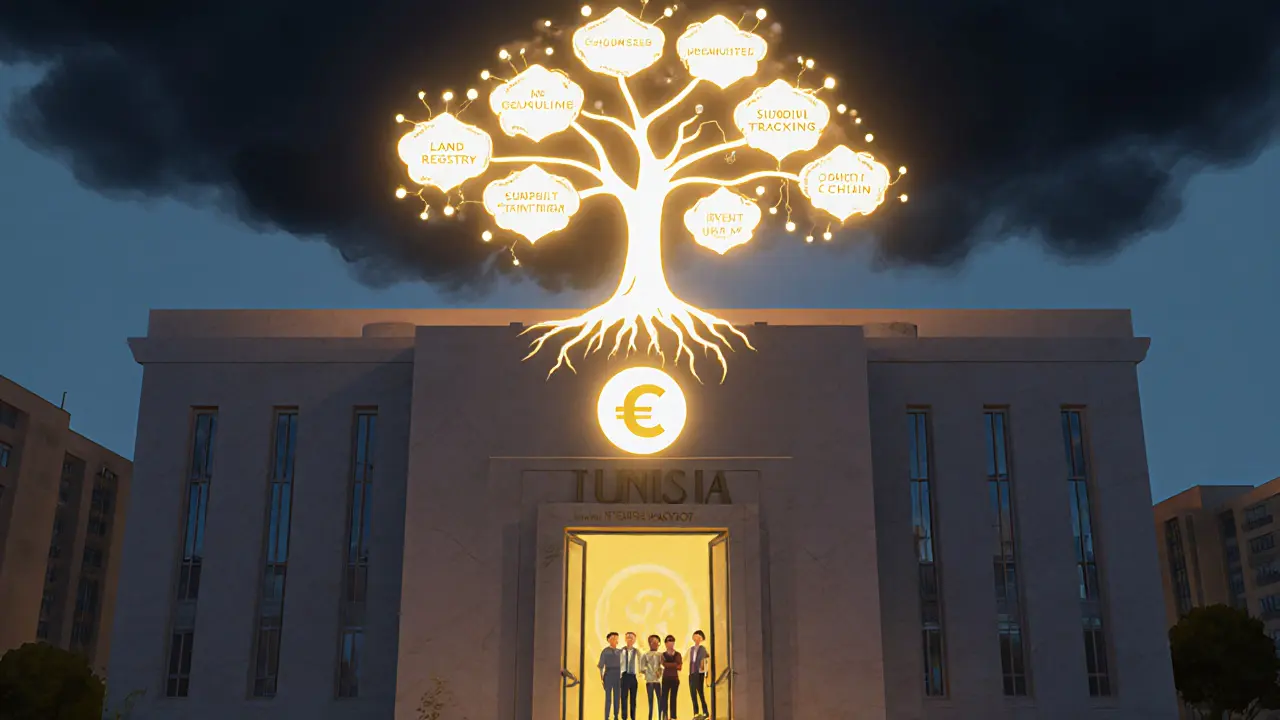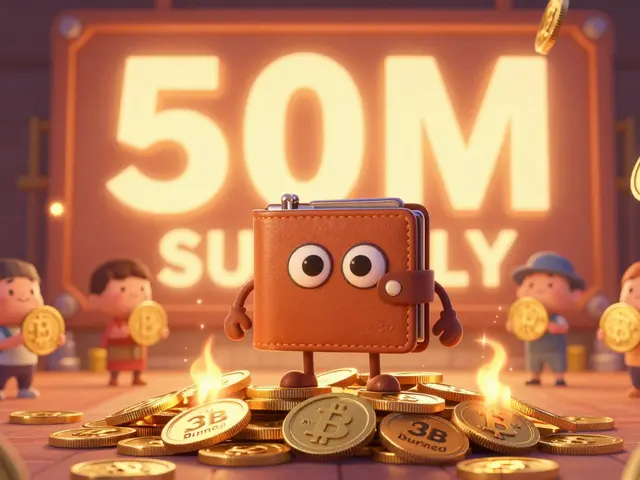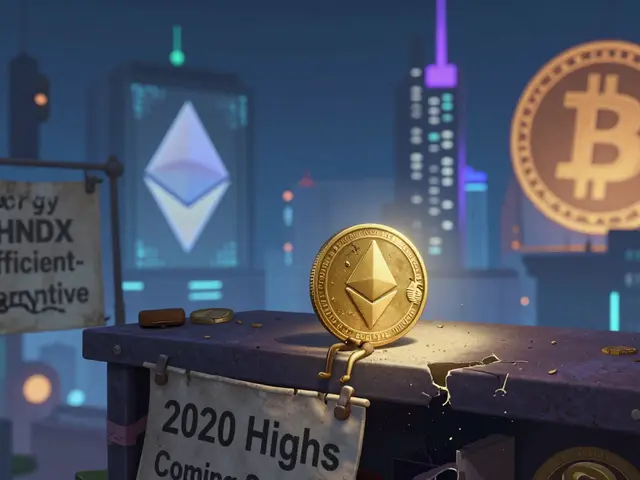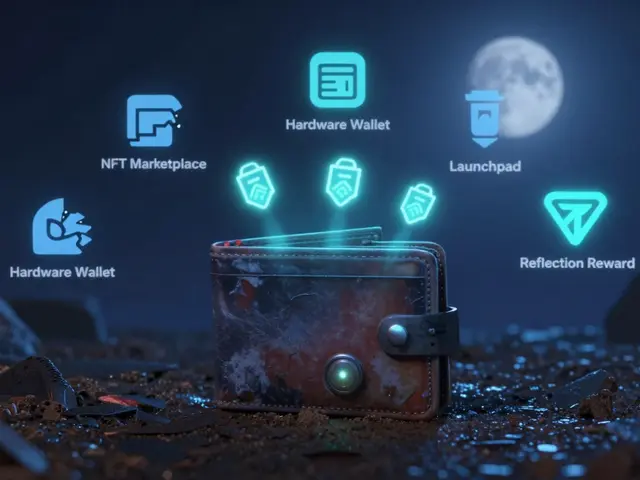On paper, owning Bitcoin in Tunisia is a crime. Not just risky-illegal. You could face jail time. That’s not a rumor. It’s the law. Since May 2018, the Central Bank of Tunisia (BCT) has banned every form of cryptocurrency activity: buying, selling, trading, mining, even accepting it as payment. No exceptions. No gray areas. Tunisia is one of only eight countries in the world with a total ban on crypto. And unlike places that just restrict banks, Tunisia shuts down the entire ecosystem.
What Exactly Is Banned?
The ban isn’t half-measured. It covers everything. If it’s digital, decentralized, and not issued by the Tunisian government, it’s off-limits. That means:- Buying Bitcoin or Ethereum on any exchange-foreign or local-is illegal.
- Running a crypto exchange inside Tunisia? Criminal offense.
- Accepting crypto as payment for goods or services? Forbidden.
- Mining with ASIC rigs? Customs will seize your equipment at the border.
- Converting mined coins into Tunisian dinars? That’s money laundering under their rules.
- Using crypto to send money abroad? Strictly blocked.
Banks don’t just refuse to help-they actively block card transactions to foreign crypto platforms. If you try to buy Bitcoin using your Tunisian debit card, it gets denied before the transaction even starts. The BCT made sure there’s no backdoor.
Why Did Tunisia Do This?
The official reason? Protecting the Tunisian dinar. In 2018, the country was struggling with falling foreign reserves, high inflation, and capital flight. Officials feared people would swap their dinars for Bitcoin and move money out of the country faster than regulators could track. That’s not just speculation-it’s what happened in the years before the ban.From 2013 to 2017, peer-to-peer Bitcoin trading was quietly growing. People used WhatsApp and Telegram groups to swap cash for crypto. It was small-scale, but real. The Central Bank saw it as a threat to monetary control. If citizens start using an unregulated currency, they lose the ability to manage interest rates, control inflation, or respond to economic shocks.
Money laundering was the other big concern. Tunisia has a history of weak financial oversight. The government worried crypto would become a tool for corrupt officials, smugglers, and criminals to move cash without leaving a paper trail. That fear led to strict AML rules-even for legal businesses. If you run a company in Tunisia, you must verify every customer’s identity with a national ID and utility bill. Records must be kept for ten years. Suspicious activity? Report it within ten days to the Tunisian Financial Analysis Committee.
What’s the Penalty?
The law doesn’t mess around. Violating the crypto ban can lead to fines and up to five years in prison. That’s not a warning. That’s a sentence. In 2021, a 17-year-old Tunisian teenager was jailed for exchanging $50 worth of Bitcoin with a friend. The case made headlines. People were shocked. How could a kid get locked up for trading a few hundred dollars?The arrest sparked public debate. Social media lit up. Some called it absurd. Others said the law needed to stay strict. The case even reached the cabinet. It didn’t change the law-but it showed cracks in the system. People were starting to ask: Is this ban actually working?

Is Anyone Still Using Crypto?
Yes. Quietly.The ban didn’t kill crypto-it drove it underground. There’s still peer-to-peer trading happening. People meet in cafes, swap cash for crypto via mobile wallets, and transfer funds through offshore exchanges. Enforcement is inconsistent. A teenager gets arrested. A year later, someone else does the same thing and walks away with a warning. It depends on who’s looking.
But mainstream adoption? Nearly zero. No local businesses accept crypto. No ATMs. No wallets built for Tunisians. The banking system is completely locked out. Without access to banks, crypto stays a niche, risky activity for a small group of tech-savvy users-not a financial tool for everyday people.
What About Blockchain? Isn’t That Different?
Here’s the twist: Tunisia doesn’t hate blockchain. It just hates crypto.In 2020, the Central Bank launched a regulatory sandbox-a controlled testing zone for fintech startups. Companies can apply to test blockchain-based projects: supply chain tracking, digital land registries, even AI-generated NFTs. But here’s the catch: they can’t touch cryptocurrency. They can build on blockchain, but they can’t issue tokens or trade coins.
Startups like VFunder (crowdfunding), Hydro E-Blocks (carbon credits), and No Phobos (NFT art) have gone through the sandbox. But they host their servers outside Tunisia to stay legal. The government wants blockchain for efficiency-not for decentralization.
That’s the real story. Tunisia sees blockchain as a tool to digitize government services. It wants to track subsidies, reduce fraud in public contracts, and modernize land records. But it refuses to let citizens own or trade digital assets. It’s like allowing someone to use a car engine-but not the steering wheel.
How Does Tunisia Compare to Other Countries?
Tunisia’s stance is extreme. Most countries don’t ban crypto-they regulate it.El Salvador made Bitcoin legal tender. Germany and Switzerland treat it as property. Singapore has clear licensing rules for exchanges. Even Vietnam and Kuwait, which restrict banks, still let people trade privately.
Tunisia sits with only seven other countries: China, Qatar, Egypt, Algeria, Morocco, Nepal, and Bangladesh. All of them are either authoritarian regimes or economies under severe stress. That’s not a coincidence.
Compare that to the U.S., Japan, or the EU-all of which have detailed rules for exchanges, taxes, and consumer protection. Tunisia has none. It just says: no.

Is the Ban Going to Last?
Maybe not.In 2025, a draft bill is being discussed in parliament. It would decriminalize simply owning cryptocurrency. Instead of jail time, violators might face fines. The plan? Create a licensing system for exchanges and wallet providers-like other countries.
Why the shift? Three reasons:
- Young Tunisians are using crypto anyway. The ban isn’t stopping them-it’s just making it dangerous.
- Global pressure is growing. Companies like PayPal and Tesla accept crypto. Tunisia’s economy can’t afford to be left behind.
- The BCT’s own Digital Tunisia 2025 plan includes blockchain for public services. That means the government already accepts the tech. It’s just holding back on the money side.
But change won’t come fast. The Central Bank still fears capital flight. The dinar is weak. Foreign reserves are low. Officials worry that opening the door to crypto could trigger a rush to convert savings into Bitcoin, destabilizing the economy overnight.
So the government is moving slowly. Testing blockchain in controlled environments. Watching what happens in neighboring countries. Waiting for global standards to settle.
What Should You Do If You’re in Tunisia?
If you’re a resident: don’t risk it. The penalties are real. Even small trades can lead to legal trouble. Don’t buy crypto. Don’t mine. Don’t accept it as payment. The risks far outweigh any potential gains.If you’re a foreigner visiting: don’t try to use crypto to pay for things. Local vendors won’t accept it. ATMs won’t work. Your card will be blocked. Stick to cash or local cards.
If you’re a developer or entrepreneur: focus on blockchain applications that don’t involve tokens. The sandbox exists for a reason. Build solutions for public services, logistics, or record-keeping. That’s where the opportunity lies-without the legal risk.
What’s Next for Tunisia?
The country stands at a crossroads. On one side: maintaining a strict ban to protect its currency. On the other: embracing regulation to unlock innovation and connect with the global digital economy.The next five years will decide which path it takes. If the draft bill passes, Tunisia could become the first North African country to legalize crypto under a regulated system. If it doesn’t, the underground market will keep growing-and the gap between law and reality will widen.
One thing is clear: the world is moving toward digital money. Tunisia isn’t immune. The question isn’t whether it will change. It’s when-and how.
Is it illegal to own Bitcoin in Tunisia?
Yes. Under Tunisia’s 2018 Central Bank directive, owning, buying, selling, or trading cryptocurrency is illegal without state authorization. Possession alone can lead to criminal charges, including fines and up to five years in prison. The law treats crypto as an unregulated currency, and holding it is considered a violation of currency control regulations.
Can I mine Bitcoin in Tunisia?
No. Mining Bitcoin or any other cryptocurrency is banned. Customs authorities have the power to seize ASIC mining equipment at ports and borders. Even if you mine successfully, converting mined coins into Tunisian dinars is considered illegal currency exchange. The ban covers all stages of mining-from hardware import to coin conversion.
Can businesses in Tunisia accept crypto payments?
No. Merchants are strictly prohibited from accepting cryptocurrency as payment for goods or services. This includes online stores, restaurants, and service providers. Any transaction involving crypto as payment is treated as a violation of the 2018 ban and can result in legal action against the business owner.
Are there any legal crypto exchanges in Tunisia?
No. There are no licensed crypto exchanges operating inside Tunisia. All exchanges-whether local or foreign-are blocked by the Central Bank. Banks refuse to process transactions to crypto platforms, and no company has been granted permission to run a domestic exchange under current law.
Is blockchain technology allowed in Tunisia?
Yes, but only in controlled settings. Tunisia allows blockchain use through its regulatory sandbox, where approved startups can test applications like supply chain tracking, digital land registries, and subsidy distribution. However, these projects must not involve cryptocurrency tokens or decentralized finance. The government supports blockchain for efficiency-not for digital money.
Will Tunisia ever legalize cryptocurrency?
Possibly. As of 2025, a draft bill is under review in parliament that would decriminalize crypto possession and create a licensing system for exchanges. This would mark a major shift from the current ban. However, no timeline has been set, and the Central Bank remains cautious due to concerns over currency stability and capital flight. Change is likely, but it will be slow and tightly controlled.







Write a comment